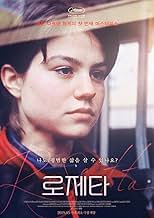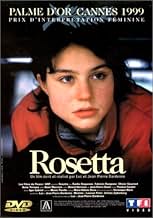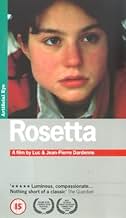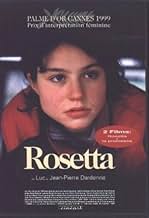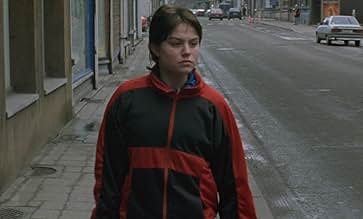Rosetta
- 1999
- Tous publics
- 1h 35min
NOTE IMDb
7,4/10
16 k
MA NOTE
La jeune et impulsive Rosetta vit avec sa mère alcoolique et, mue par le désespoir, se montre prête à tout pour conserver un emploi.La jeune et impulsive Rosetta vit avec sa mère alcoolique et, mue par le désespoir, se montre prête à tout pour conserver un emploi.La jeune et impulsive Rosetta vit avec sa mère alcoolique et, mue par le désespoir, se montre prête à tout pour conserver un emploi.
- Récompenses
- 10 victoires et 7 nominations au total
Leon Michaux
- First Policeman
- (as Léon Michaux)
Histoire
Le saviez-vous
- AnecdotesContrary to popular belief, the film did not inspire a new so-called "Rosetta Law" in Belgium that prohibited employers from paying teen workers less than the minimum wage and included other youth labour reforms. In a Guardian interview with the Dardenne brothers, Jean-Pierre explained the misconception: "No, that law already existed, it just hadn't been voted through yet. The truth is always less interesting than the fiction."
- GaffesWhen Rosetta is giving her mother money for a water bill she is wearing a jacket with the sleeves fully extended. However in the next immediate cut when she goes outside the sleeves are rolled up.
- Bandes originalesSomething New
Commentaire à la une
This small Belgian film was the unexpected winner of the Palme d'Or at Cannes during the year when David Cronenberg and his panel of contrarians ruled. Because other, more popular films ("All About My Mother," "L'Humanité," "The Straight Story") were passed over, "Rosetta" has received a reputation as an undeserved winner. I am here to proclaim it a great film and a worthy addition to anyone's Best list. I have not researched whether or not the director of "Rosetta" set out adhere to Dogma 93 principles, but many of them are present no movie makeup, natural light, natural locations, no soundtrack music, and hand held cameras. The camera follows one person the title character so that just about every shot is either of her or from her point of view. Rosetta lives with her alcoholic prostitute mother in a camping trailer at a run down campground called The Grand Canyon. She is in her late teens, doesn't have any friends (except one she meets during the course of the story) or even communicates much with other people, and is only interested in getting a regular job and living a normal life. In a remarkable episode, we see her in bed just before going to sleep. She is having a conversation with herself that goes, "You have a job. I have a job. You have a friend. I have a friend. You have a normal life. I have a normal life. Good night. Good night." Rosetta is played by Émilie Dequenne (who won Best Actress at Cannes). She is so good, so natural, so much *Rosetta* that, along with the photographic technique, she gives the material a documentary feel. One reviewer even called her a "non-actor" as if she were not a professional actress (this is her first movie role) and had been picked right out of that campground to play her own life. The film goes by quickly even as the plot unfolds slowly. We follow Rosetta as she travels her city by foot and bus looking for work, catching fish to eat from an urban river, and tentatively letting one other person into her routines. Sometimes character motivation may seem murky, but it is a thrill, later, when you realize what was really going on. If I remember correctly, there is only one brief dialog exchange near the end where one person explains plot points to another for the audience's benefit. The ending is a tender moment that may indicate a new stage in Rosetta growth. Highly recommended. A beautiful and deeply felt film.
Meilleurs choix
Connectez-vous pour évaluer et suivre la liste de favoris afin de recevoir des recommandations personnalisées
- How long is Rosetta?Alimenté par Alexa
Détails
- Date de sortie
- Pays d’origine
- Site officiel
- Langue
- Aussi connu sous le nom de
- Розетта
- Lieux de tournage
- Sociétés de production
- Voir plus de crédits d'entreprise sur IMDbPro
Box-office
- Montant brut aux États-Unis et au Canada
- 266 665 $US
- Week-end de sortie aux États-Unis et au Canada
- 20 187 $US
- 7 nov. 1999
- Montant brut mondial
- 293 092 $US
Contribuer à cette page
Suggérer une modification ou ajouter du contenu manquant


![Regarder Bande-annonce [OV]](https://m.media-amazon.com/images/M/MV5BOWY4MGMzYTItZjQwOS00MmVhLWE0MDYtMGZmYmFjNTkyYTU2XkEyXkFqcGdeQXRyYW5zY29kZS13b3JrZmxvdw@@._V1_QL75_UX500_CR0)


